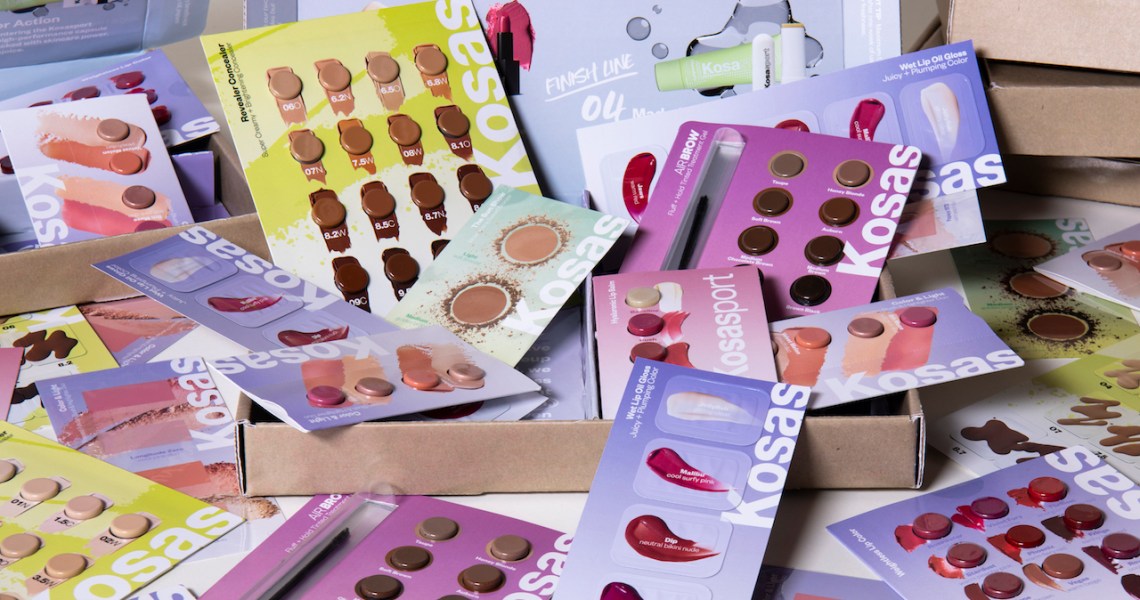As the beauty industry rethinks product testers, Kosas is rolling out a new e-commerce approach to sampling.
On May 21, the cosmetics brand will officially announce its new Kosas Try Outs, which soft-launched on April 22. Exclusively on the Kosas DTC site, the new sampling system lets customers buy samples and apply their cost as a credit for a full-size item. Samples are available for 12 products on the site in all shades of a given item. Individual samples range from $3-$5. A “take the site home kit” for $35 offers the full shade range of 12 products including concealer, tinted face oil, bronzers, blushes and lip products.
The Kosas Try Outs program “mimics the in-store experience, in that you can touch and feel every single shade, so that you can precisely find your exact match,” said Sheena Yaitanes, founder of Kosas.
Consumers remain wary of in-store sampling. According to January 2021 data from predictive analytics firm First Insight, 71% of respondents said they feel unsafe testing beauty products in-store. That number is even higher for women alone, at 80%.
The Try Outs are being launched in addition to the brand’s free individual sample packets that it distributes via its site and retail partners including Sephora and Credo. Those samples work for product discovery and getting a sense of formula and texture, but not shade matching, said Yaitanes. “You might be able to get in the ballpark of your shade, but you wouldn’t ever be able to make an exact match” with free three-shade sample cards, she said. Kosas also offers a shade-finder tool on its DTC site which includes a mini quiz and emails the results to shoppers with product recommendations.
Brands have been exploring a wide range of physical and virtual options for sampling. The sample purchase for a full-size credit model has already been popular among fragrance startups like Snif and Skylar. A growing number of brands have also been turning to AR try-on as a digital alternative to samples, but digital has its limitations.
“No virtual experience can really replace that in-real-life experience of trying makeup on,” said Adeline Leong, CMO of Kosas. “We’ve explored the technologies; we have not launched any of them. I haven’t seen any that truly replicate getting you the right shade.”
The sales model also responds to the rising cost of product samples for brands, as individual products replace in-store testers.
“Samples are definitely an expensive proposition, especially to do it in every single shade,” said Leong. While the brand did not divulge the exact price of producing samples, she said, “Sampling through the retailers is also not cheap because the quantities that you have to put out there might be 100,000 at a time.”
As spending has shifted online, beauty brands have ramped up investment in their DTC sites. “We’ve definitely accelerated DTC as a priority,” said Leong. “We really think about ourselves as a multi-channel business. [DTC is] an important touchpoint and an opportunity to really engage with our customer in a way that we can’t via a retailer.”
Despite the pandemic’s makeup slump, Kosas has more than doubled its sales across all channels in the past year.
With Covid-19 rates decreasing in the U.S., the brand is expecting consumers to have a wide range of attitudes toward samples when some degree of normalcy returns.
“Some people will adopt the new option of sampling from home or shopping online exclusively, and some people will return to stores normally and feel comfortable. We’re going to see a mix of the two,” said Yaitanes.




